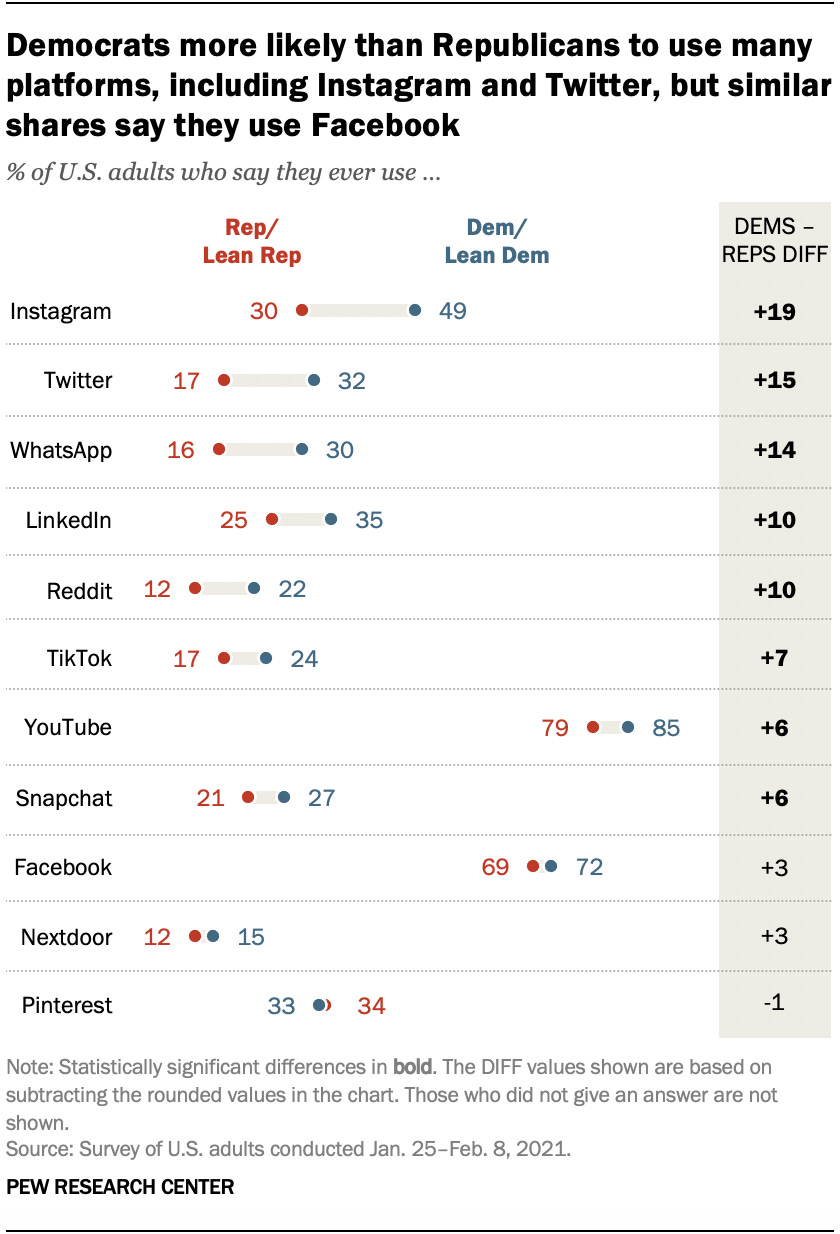When you think about arguing online, which platform do you picture? It probably isn’t Snapchat.
No, of course not. It’s Facebook. Twitter is probably another contender.
Take note, I’m not saying disagreements, like which local restaurant is best, and I’m not talking about political commentary in general, with a whole bunch of like-minded people angrily saying similar things. No, I’m talking about long, drawn out bickering with both sides just screaming past each other.
Facebook is going to be at the forefront, whereas Instagram and YouTube are less likely to top your list of examples. Why would this be?
(Again, I’m not saying arguments don’t happen on Insta, I’m saying Instagram is just not as infamous as Facebook for arguing. It isn’t. There’s a reason why Meta, which owns both, is only experimenting with anti-fighting algorithms on Facebook.)
A big part of it is simple demographics: who makes up the majority of the populations on these platforms will dictate the norms of acceptable behavior, if only out of sheer numbers. Considering also that social media is a newer development and skews young, who as a group skew liberal, it should be no surprise that Pew Research found that all social media platforms (except Pinterest, which is essentially 50-50 within the margin of error) have user bases that lean to the left, in some cases by pretty huge margins:
Facebook has been around the longest; it’s going to have the largest user base. As such, the partisan split is small by comparison to the newer platforms that skew heavily to the young, who in turn skew to the left significantly. By sheer weight of people, you have the greatest mix of both ends of the political spectrum on Facebook and there is no clear majority; by these facts alone you are going to get some fighting.
Consider this interesting study on the relationship between narcissism and use of Twitter versus Facebook. It’s worth using narcissists as the extreme examples of social media use, which by its nature is self-promotional. The way in which narcissists use these platforms can inform us about our own tendencies, as to some extent, everyone is a little self-focused. It’s like a measuring stick for problematic social media use. (Btw, totally unrelated, please share this article.)
Davenport et al. (2014) looked at groups of college students and those sampled from the adult population (the mean age was 32 but the upper margin was 75), and compared their motivations and use habits of Facebook and Twitter while also assessing traits indicative of narcissism. Their data was collected and analyzed in the early 2010s, so we’re talking about comparing Millennials (and my microgeneration in particular, who I call the “Middle Child Millennials” — those born 1988-1994) to Gen X and Baby Boomers.
Davenport et al. found that narcissistic Millennials preferred to post to Twitter, while narcissistic Gen X/Baby Boomers preferred Facebook. Their speculation as to why was a refreshing counter-narrative to the prevailing diatribe against my generation at the time:
The post hoc model results call into question the barrage of press linking the rise in social networking to the rise in narcissism among Millennials, as narcissism had no significant direct or indirect relationship with active usage on Facebook for the college population (i.e., Millennials). However, narcissism was both directly and indirectly related to active usage among adults, suggesting that narcissistic active users of Facebook are now more likely to be of the Gen X and Baby Boomer generations than Millennials. Our findings might reflect the fact that Millennials grew up using Facebook as a part of their lives, as a means of communicating with others just as previous generations might have used a telephone. Older generations who have not grown up with this tool require a more intentional reason to “update status” as it is not part of their social norms, and narcissistic motives may be an intentional reason for adults’ movement into active Facebook usage.
There’s a whole lot here worth unpacking, and I likely will in subsequent posts, but I wanted to just highlight the demographic splits between the platforms. Ten years ago, Facebook was already rapidly becoming the platform for Gen X and Baby Boomers, while Millennials were starting to migrate away to Twitter and Instagram and other platforms. The 2020s have seen this trend accelerate; Facebook has been unable to attract young users for a long time now.
But there’s something else in the Davenport et al. study that I wanted to highlight, in the context of how the design and structure of a platform influence behavior. Interestingly, narcissism was not found to be associated with the amount of posting, even about the self. Self-promotion to one degree or another is just simply intrinsic to the nature of these platforms; it was not associated with narcissism at all. However,
…narcissism was a stronger predictor of Facebook friends than Twitter followers in both the college and adult samples. This may be a result of the affordances made by each platform. Facebook allows narcissistic users to make friend requests directly, while Twitter users typically acquire followers by garnering interest in the tweets that they generate. Thus, the narcissistic desire to accumulate Facebook friends may be accomplished simply by making direct requests; however, a desire to accumulate Twitter followers must be accomplished by creating interesting “tweets” so that others opt to follow you. Thus, active usage on Twitter becomes critical with respect to narcissism, and the results of the mediation analyses bore this out.
I really want you to take away this point: the design of the platforms shapes behavior. By its very structure, Facebook encourages people to carefully craft their public persona so as to accumulate (and keep) as many “friends” as possible, no matter if these relationships are meaningful. Just keep them hearts and likes a’comin’.
Twitter, meanwhile, encourages people to post short, punchy, clever witticisms and to be as spicy as possible so that more people retweet you. Think about it: how often have we heard some variation of “Lauren Boebert destroyed on Twitter” or “Twitter DEMOLISHES Demi Lovato” or some such claptrap? Seriously, with the way Twitter is designed, we should expect Twitter to be the absolute worst for fighting. Right?
Wrong.
Facebook has more fighting than Twitter. By a lot.
Why would this be? How is it that Twitter, which is practically synonymous with fighting and mud-slinging, has far less fighting than Facebook, which is designed to reward as much pro-social behavior as possible?
I believe the answer has everything to do with those stupid little likes and hearts, as well as their siblings, the laugh, angry, sad reacts, and the dumbest of them all, the pandemic-era “care” react.
I’ll explain my reasoning in Part 2.








